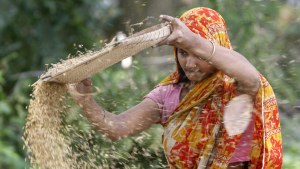The Next Generation: Engaging Youth in Agriculture
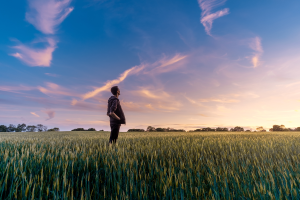 Play Podcast
Play Podcast
About the Episode
Agriculture is an aging industry, with the average age of a US farmer increasing to almost 60 years old in 2022, which leads us to ask: why aren't young people getting involved? This week on our first episode of the limited podcast series Youth in Agriculture: Transforming Local Food Systems, Avani Rai and Sarah Evanega dive into youth engagement in agriculture, and discuss the different avenues youth can take to get involved and the pressing issues they are confronting.
[Intro music.
Natalie Burdsall: INTRO: Hello and welcome to the audio blog series Youth in Agriculture: Transforming Local Food Systems, produced by the Chicago Council on Global Affairs' Center on Global Food and Agriculture. Today, we will be listening in on a conversation with Avani Rai, a high school senior and 2023 Youth in Action Finalist for 4-H, which is the nation’s largest youth development organization, and Sarah Evanega, Director of Stakeholder Communications at Pairwise.]
Avani Rai: I'm Avani Rai. I'm a senior from Normal, IL, which is just around central Illinois. We’re in the middle of cornfield country in McLean County. I am a seven year 4-H'er, and so I've been a part of 4-H at the county, state, and national level. My interest in 4-H, around the high school age, diverged me to addressing healthy living specifically through food security across the state of Illinois. And I was fortunate to be a part of two statewide teams in Illinois 4-H—both the Food Advocacy team and the Healthy Living Ambassadors team. And so together as a state officer representing 4-H on the national stage, I've been able to not only learn more about the emergent issues of food insecurity and food law and policy as a whole, but also taking advantage of several very cool opportunities when it comes to addressing food security together, and specifically, youth-led food justice activism. And so, I'm excited to have this conversation to see what more I can learn.
Sarah Evanega: Avani, like you, I also grew up in the great state of Illinois, a little further north than Normal, but certainly was shaped by that experience of living in a tiny, rural town, in my case, a town of 300 people and like you, surrounded by corn. So, fast forward a number of years, I'm a plant scientist by training and I have spent most of my career advocating for access to agricultural innovations, including genomic technologies that I believe are poised to really help solve problems and also improve our food system. Recently, about a year ago, I left academia and joined Pairwise, a mission-driven food and tech startup that's committed to building a healthier world through better fruits and vegetables and remove barriers that keep people from eating fruits and vegetables. I'll also add that I'm the mom of three really great kids, ages seven, nine, and 12, who I am proud to say are great cooks and very experimental eaters. So, maybe I'll just kick it off with a question, if that's okay?
Avani Rai: Sure, definitely.
Sarah Evanega: So, I'm super excited to meet you, very impressed by your work in ensuring access to food in your local community and also around the world. What gets you excited about working in this space, about working in food and agriculture?
Avani Rai: So that's actually a great question because for me, living in McLean County, it felt like agriculture was the norm, and not what I wanted to do when it came to any sort of future careers or future plans. But 4-H was really the organization that introduced me to not just agriculture and the food industry as a whole, but specifically the issue of food insecurity at the in-depth level that I've come to learn of it today.
And, so, while I started my 4-H career as a STEM kid—I was a robotics, an aerospace kid, as well as public speaking leadership at the county fairs—4-H has a very large agriculture and healthy living presence in the organization as a whole. And, so, something that I always realized being a part of several community service projects on my own in the Bloomington, Normal community was that when it came to food drives or local food collection items, it was often the items that no one wanted that were donated, right? It's always the back shelf items that you just haven't gotten around to cooking that are often given away, and while that's always important, it was clear to me that it wasn't the best food that was being given away, and the only organization I really saw calling attention to that was the 4-H Illinois State Food Advocacy Team, which is a team that came out in 2019, 2020, which, March of 2020, if you remember, is exactly when the pandemic started to hit. But the team was initially started as something that was supposed to be a very hands-on, youth-led service and activism team that helped to address food insecurity inclusively—which means keeping in mind dietary restrictions, allergens, a variety of other things that can restrict someone's access to healthy food while addressing the issue—and because of the pandemic, we really quickly had to shift from that hands-on team to a more advocacy- and education-based team. Somehow, through zoom or online seminars—we had to figure that out on our own—would still be able to have an impact statewide. And that entire experience, and not only learning so much from those teams and those other youth from across the state, but also figuring out how to give that information and help raise awareness and education surrounding that issue, is something that really, really helped me not only realize the gravity or the importance of addressing food insecurity, but also realizing that this is an issue that is so easily, you know... we don't really think of hunger as a large, prominent issue in the United States, but when you really delve into it, that's clear that it is.
Sarah Evanega: Yes. And what important work at such an important and critical time. So, I commend you for that. Based on what I know about you and listening to your remarks at the White House Conference on Hunger, Health and Nutrition, I think we both agree and that we have a quality, not a quantity, problem when it comes to calories in our food system here in the US. So, what are you learning from your work about how to promote the consumption of quality calories?
Avani Rai: That's a great question. I think a lot of it has to do with not only the messaging around food that exists in our country, but also making sure that the right groups are connected together. So, for example, currently I serve on the Illinois Department of Agriculture's Local Food Purchasing Assistance Committee, which is a committee that was created of representatives and stakeholders from across the state in a variety of public and private organizations because the United States Department of Ag gave us about $14 million of grant funding that we could then use to strengthen food systems in Illinois by connecting underserved farmers to underserved communities across our state. And, so, really figuring out how to, first of all, switch the messaging and make it more clear the importance of healthy food, but also make that process as easy as possible for our most vulnerable population. Because when it comes to those underserved communities, it's often whatever food they can get their hands on, whatever food is the easiest for them to access, that ends up going in the refrigerator when we do have a surplus of food that is healthy and is available, but sometimes it's not affordable, sometimes it's not accessible. And that's the key issue that I think we have failed to address substantially as a country, or at least come up with a sustainable solution to ensure that those communities get the food that they need.
Sarah Evanega: That's great. I love this idea of connecting local farmers with distribution mechanisms to get good healthy food into the hands of the people who need it most. And that really addresses the challenge that you were speaking about earlier around the food that gets donated to food pantries, etcetera, is kind of the food nobody wants, right. And so yeah, getting that quality food, that's culturally relevant, healthy, nutritious—that's great. Thanks for that.
Avani Rai: So, I was wondering on your side, for me, even, you know, as a high schooler applying to colleges—I'm just now hearing back from a lot of them—as far as food insecurity or food law being a career option—I don't think that's something that's really been talked about, or at least something that I wasn't aware of for a very long time. So, for someone that is in the field and is currently in a career that addresses those issues, what are some different avenues that youth can take if they would like to continue their passions for food security beyond high school?
Sarah Evanega: Yeah, well, there's so many great programs out there, but one of my observations from my time at Cornell, when I was in international programs and global development, where a lot of students sort of came interested in working in food systems, working in international agriculture, you know, young people motivated like you who really want to make a difference in the world, but aren't quite sure—unlike you—figure out how to do it all the time, but they know that they want to have impact in the world, and that that kind of energy is so inspiring, right? And, so, I would see a lot of young people coming into programs knowing that they want to have impact, but maybe not knowing quite what toolkits they would need to have impact. And, so, they might come into like an international field of some sort, have a couple of internships, or maybe, maybe their first experience working or engaging abroad, and seeing a whole new world and realizing that, “You know, if I want to really have impact, if I really want to help advance food security out there in the world, I need a toolkit.” And that toolkit can take so many different forms. It might be a focus in plant science. It could be a focus in plant breeding, could be a focus in, animal science or dairy science. It could be a focus on economics and business. But I do think that having that kind of core toolkit to draw on to really have an impact out in the world is important. So, those core majors can be applied in so many different and interesting ways. So, I would say find your passion, find the toolkit that feels right for you, that's the right fit, and then you can do anything.
Avani Rai: Definitely. That's awesome. What about students on college campuses, or even in high schoolers? If you look at teenagers that are interested in getting involved or see an issue in their community, do you have any suggestions for them as far as mentors or organizations they can connect with? I know for me 4-H has been a great example of that, but are there others that you're aware of?
Sarah Evanega: Yes. And I think that's going to be... there's, again, so many great organizations out there, and the opportunities are really endless. So, as a college student, obviously, there's so many campus programs that you can engage in. I also think that one of the exciting things about being in the shelter of university is there's so much opportunity to grow your own programs and build something new that hasn't existed before and to seek the support of the university, to seek the support of mentors and also connect them with community organizations. It’s easy to get sequestered away in the university world, right? And forget that you actually are living in the context of a community, and that you, as a college student, can also engage in that community. So, I would say keep doing what you're doing, look around, find the organizations that interest you—if they're not there, build them yourself, find mentors, find partners. The resources are there if you look. You can do anything. So, I have no doubt you will find amazing opportunities as you pursue your next degree. So, it's exciting times and I will be watching carefully to see if you go—because if you're anywhere near me, I'll be in touch.
You mentioned the word access earlier, right. And we hear a lot about access—access to food, access to nutrition. But access is complicated, right? And it can mean a lot of different things to a lot of different people. So, when you think about access, and all the issues that that entails, what do you think are the most critical components of access, and which ones are the most urgent to tackle?
Avani Rai: That's a great question, I think, for me, when it comes to access, the easiest example to consider is when you think about food deserts, right? So, food deserts—there might be a variety of different factors or a variety of different nuanced examples of what exactly a food desert is, but at the core, it's essentially an area where the food options that are available to citizens living in that area are not healthy by any standard. So, that means, that maybe that it's a rural, rural town that doesn't have that sort of processing power, or maybe it's a suburban area that has a lot of gas stations, but no actual healthy food options. And so to me, access is one, the accessibility or the proximity of healthy food that is not only sustainable, but also affordable for your family. But two, that these foods are both culturally and—culturally accessible, but also easy to use for a variety of different traits that we often don't consider. So, for example, one of the things that I learned about through 4-H, attending a national conference just a few weeks ago, was the various barriers that can be in place for individuals that might have special needs when it comes to the food that is offered to them because those individuals sometimes might have issues with certain textures, or colors, or the way that food is distorted. Or when you think of cultural barriers, it's very clear that some of the communities in our state and even our country prefer certain foods over others, and know how to use and create meals with certain foods compared to others. And so that accessibility is really two-part: one is proximity—is there healthy food nearby that is affordable and that I can actually use and get to—but then that second part is, is it food that I'm comfortable using and bringing home to my family? So, that's what I would say are the two major components when I think of accessibility.
Sarah Evanega: Yeah, that really resonates. When I sort of think about it as, you know, the three A's: availability, affordability, and is it even appealing? Does it appeal to my family, does it appeal to my culture?
Maybe we can shift gears a little bit and, and talk about the elephant in the room, if you will: climate change. The world is facing a climate crisis like we've never seen before. It makes food production more difficult and yet food production is part of the problem, right, as a major contributor to aspects of what's causing the climate crisis. How do you think we can really, sort of... not just thinking about agriculture as the problem, but shift gears so that agriculture is seen as part of the solution that we can work together to sort of identify how to move toward agriculture being part of solution as opposed to part of the problem?
Avani Rai: Definitely. That's a good question and I, honestly, will probably kick this back to you at the end because I want to hear your thoughts on it, as well. But I think for me, growing up in my generation, I feel like climate change has always been something that has been a prominent issue that's kind of agreed upon as an issue that needs to be addressed soon, which is to say, at least from my understanding, I don't think that's necessarily been the case in the past few decades that we've seen as far as policy that's been pushed out as well as the overall public sentiment regarding the issue.
So, I think that's one major change that we've seen recently that will definitely be a benefactor to resolving the pressing issue of climate change as a whole. But, also, I think that innovation is key when it comes to addressing, specifically, what the agriculture industry can do. So, for example, hydroponic is something that I've been fairly interested in recently. And I think that solutions that can be easily recreated like that, where if you put in original thought to it, you can really come up with something that can have a broad impact. I think that it takes concentrated effort to come up with things like that. And so the first step is understanding that and acknowledging the issue that we have, but then also choosing to address it and putting our heads together to actually come up with a solution that not only is resolving the overall issue, but also accessible and sustainable for the individuals in our agricultural industry to actually take part in. I think that often, when we come up with solutions, it's not always something that is come up with with all the stakeholders in mind. So, whether that's our farmers or our distributors or whatever it is, making sure that all of our interested parties are able to actually support that solution is an important piece that we don't always see take place. But for me at least, as I kind of go into college and I am starting to think at least about being a voter—I'm going to turn 18 this summer—something that is always a concern for me is these issues that we've seen that have been building up for generations and the fact that up until now we haven't really come up with a firm idea of how to handle them. Do you think that issues like climate change that have only become more pressing with time will be able to be resolved in the next coming a couple of years? Do you think that there's a shift taking place, or do you think that we're still kind of stuck in that same rut that we have been for a while now?
Sarah Evanega: Yeah, I mean, I think it's going to take an amazing amount of political will and people putting their own agenda aside and coming together. And I mean that in itself would be unprecedented, right?
Avani Rai: Right.
Sarah Evanega: It’s sad that it takes a crisis to bring people together. But we've seen so many beautiful examples of how there's been so much unity and so many positive things that have come out of the crisis of the COVID pandemic, for example. People coming together as communities, as countries as a global community. So, I still hold on to hope that that we'll get there. We have to. There really isn't an alternative. So, it's just a matter of how proactive we can be, right?
Avani Rai: Do you think that there will be, like, something that'll catalyze the movement, or is that the younger generation that's coming up? Do you think there is going to be one big issue or, maybe, conflict that takes place that spurs the momentum towards the change, or do you think it'll be a gradual process?
Sarah Evanega: I think it'll happen at various levels. I think it's already happening at local levels where you see the impacts of climate change affecting communities at the local level and they're coming together to react and find solutions that will be additive over a larger space. But I also do think there needs to be more action at the global level. And absolutely young people will drive that action. We've seen that already, the power of Greta Thunberg, right, and what she's sparked around the world. There's no better example, right, of how one young person can have such global impact. I do think young people will be major drivers. The energy the young people bring. The, you know, lack of ego, the more collaborative culture of young people. I hold a lot of hope for the young people. But you shouldn't have to shoulder the burden, right?
Avani Rai: Right.
Sarah Evanega: It shouldn't be about young people, like, okay, yeah, you have energy and you have great ideas and you're innovative and, you know, you're, you're at the top of your innovation game. But do you have a seat at the table? Do you have the resources to actually implement and drive forward your innovative plan? And that's where I think people in power, if you will, people who have the seats at the table, they need to step away and give the seat to the—or maybe you don't need to step away, but just offer, offer a seat by your side to a young person, so that they have a voice to the table. And, I mean, to some extent I think that's what this blog series is really trying to do, right? To elevate the voices of young people, to give you a figurative seat at the table. That's essential. We need to move the resources. We need to move the power. The people who have the most to lose and the most to gain—those are the young people today.
I want to go back to something you said about innovation.
Avani Rai: Right.
Sarah Evanega: And the role that innovation can play in helping make sure that agriculture's part of the solution and not part of the problem. And you said something about bringing stakeholders together. And you mentioned farmers and it sort of struck me—isn't it interesting how everybody likes sit in very important rooms and talk about food and agriculture, and so often we forget to actually invite a farmer to the table, right?
Avani Rai: Oh, 100 percent.
Sarah Evanega: The people who produce the food. So along with young people, I would say that we really need the people who are actually engaged in the in the process of growing food to be at the table and to share the challenges that they're facing. Because only then can we figure out, together, how to innovate to overcome those challenges. But certainly... like when I think about agriculture as part of the solution, I mean this is pretty core to the work that I've done across my career of, you know, ensuring that we don't demonize innovation, that we embrace innovation and we see the potential for how to solve problems using innovative tools. And, you know, we've seen over the past couple of decades a lot of demonization of agriculture and agricultural tools.
You know, I work a lot in the biotechnology space and when I think about the solutions that biotechnology can bring to agriculture—growing crops with fewer inputs, less water, disease resistant crops, resilient crops that can stand up to the conditions that in climate change—being able to use these innovative tools to produce a cleaner and greener agriculture. There's so much potential and we see applications of biotechnology that absolutely can help us reduce synthetic nitrogen fertilizer use, reduce methane emissions in paddy fields, that can help us reduce insecticide use. You have the biotech eggplant in Bangladesh, 62 percent reduced insecticide use. I mean, that's a win, right?
Avani Rai: Right.
Sarah Evanega: And so it baffles me how there's still this resistance to technology that, that is proven safe, proven effective, and holds so much potential for doing ag in a much more sustainable and greener way. So, I'm optimistic. I do think we're kind of at a tipping point where people are like, “You know what? I think we need to rethink our views on some of these innovative tools,” because the challenges have gotten to be so great, that we have to be more accepting. And, again, that's where young people come into... young people—they want their food to be produced more sustainably. They're willing to pay more to ensure that it is. They're accepting of technology and food. They have a different relationship with technology than generations of the past. And, so, I think they're driving forward a much more tech-embracing, tech-accepting narrative around food and agriculture.
I also think that if we expect young people to actually get into the business of farming—which is not an easy business to be in—we have got to offer them tools to be able to do it in a way that is efficient, green, and profitable, quite frankly. I'd be really keen to hear your perspective on how do we get people interested in food and agriculture? I mean, I taught plant science for a long time and people don't come in interested in studying plants and agriculture, right? Well, like, you and I both grew up surrounded by corn. And the last thing we wanted to do was get into agriculture. And here we are, right? There's something in the air or in the water. But, you know, if you grew up in a rural community whether it's in the US or in sub-Saharan Africa, if you grow up in a rural community where poverty was the norm and agriculture was the norm, like, what's the incentive to stick around and do agriculture, right? Especially if it's associated with backbreaking work and hoes and poverty and subsistence level living? So, how do you think about inspiring young people to sort of move beyond those associations of what it means to work in food and agriculture and ignite a more exciting view into the field and what impact you can have?
Avani Rai: Yeah, I think that's a great point, especially when we consider that the average age of a farmer has increased substantially over the past few decades. And I think that a key part of it is really what you brought up with that innovation aspect is showing youth that the industry of food and agriculture is far beyond just that traditional sense or that image we have in our head of a farmer. The ag industry today has input from science and technology, has input from policy and legislation, public advocacy—those are all different avenues—or even agribusiness—that you can take and then you can apply to that agriculture industry as a whole. And so really showing the areas for opportunity and innovation that exist in that agriculture sector, I think it's something that, as far as messaging or even just in our schools, we lack, simply because not all schools have those opportunities to share that sort of education aspect of it. So, for example, me, I can say from firsthand experience here in my school of Normal community, we have a phenomenal FFA chapter that's always doing really, really cool things. The students that we have in our agriculture program are amazing. They're some of our greatest leaders in our school. And, so, just really showing the different aspects or avenues that within the actual field of agriculture, I think it's something that we miss out on all the time. And because of it, I think we're missing out on some of the smartest kids that we have in science or math or legislation or policy that think that they can't be in agriculture if they want to pursue those passions, which, for me, as someone that wants to go into law eventually and impact legislation, I know that's not at all the case. But I think when it comes to that idea that agriculture is kind of old and dusty—it's definitely not the case and it's something that needs to be changed to reflect the way that the ag industry should be moving.
Sarah Evanega: Yeah. And I think there's this disconnect between agriculture and food. And yet most of us can't relate to agriculture because, at least in this country, only two percent of people are growing up on farms, we can all relate to food, right?
Avani Rai: Right.
Sarah Evanega: And it's at the like very core of our culture. It is the most important thing. It's the basis of life and so we can all relate to food and nutrition. That's what really motivates me and my work at Pairwise is using innovation, right? Using new tools like CRISPR. Basically, say, you know, let's improve food. We have so many great healthy foods out there that are available, but people aren't choosing to eat them, right? Rich or poor, people aren't choosing to eat them. And, so, if we ask people, well, “why don't you eat blackberries,” or, you know, “why don't you eat these nutrient-dense mustard greens?” Well, let's find out what those factors are and let's use technology innovation and our good smarts to remove those barriers and hope that people will then find these foods to be tasty, enjoyable, convenient, and that fit their lifestyles.
Avani Rai: That's a great point. And I'm also wondering if you think that there is a global aspect to this issue, because for me, a lot of my work has been statewide, and, you know, a little on the national scale. But I know a little bit, a few questions ago you mentioned that great example of Bangladesh—I was wondering if in your work you think that there's greater room for improvement when it comes to, perhaps, addressing these issues with the assistance of globalization and on a larger scale?
Sarah Evanega: I think these issues are global, right? They, I mean, we're all struggling with having sufficient quality calories that are accessible, right? And in all the ways that access might be relevant in any country context. But, certainly, you know, as we think about all of the poor-quality calories that are being moved around the world, right, instead of investing in, again, quality, high quality food systems at the local level, I see, you know, I see the politics of agricultural innovation. That is sort of a phenomenon, I think, that sort of started in Europe and the US and has been... sort of, kind of made its way out and around the world and has impacted a lot of countries’ ability to accept technology with pretty devastating impacts, right? So, you know, a poor, a poorly conducted, sort of politically driven study that's published and later retracted in the EU can have policy implications in a country like Kenya for decades. So, I think, you know, we are all a global, globally connected community and the food choices and the policy choices that you and I make here in the US, right, are going to have impacts in all kinds of places around the world. And so, I think, you know, what we do at the local level, what we do at the individual level absolutely not only has impact there, but also can have ripple effects around the world. So, we need to make sure that those, those ripple effects are positive ones, right?
Natalie Burdsall: Alright, we have reached the end of our time, so we're going to have to wrap it up. But before we finish, do either of you have anything you would like to add or anything that you didn't have the chance to speak about?
Avani Rai: I think just, first of all, thank you Sarah very much for her time today. It's definitely been enlightening, even in just this short amount of time. And I think that the opportunity to meet leaders in the field that we share is very rare, at least for me, growing up where I am. And, so, thank you very much for this opportunity, and also the time you've taken out of your day to share your thoughts and advice with me.
Sarah Evanega: It was a real pleasure to meet you, Avani. And I hope that we can continue to engage and I hope our paths cross again and we can work together toward our shared mission of ensuring good, healthy food for all.
Natalie Burdsall: Thank you again, Avani and Sarah, for sharing your thoughts and providing more insight into the ways young people engage in global food and agriculture, and how they can steward sustainable change.
[Natalie Burdsall: OUTRO: And thank you for tuning in for this episode of Youth in Agriculture: Transforming Local Food Systems. As a reminder, the opinions you heard belong to the people who express them, and not the Chicago Council on Global Affairs. This episode is produced and edited by me, Natalie Burdsall. Thank you for listening—we’ll see you again next week.
Outro music.]
Related Reading
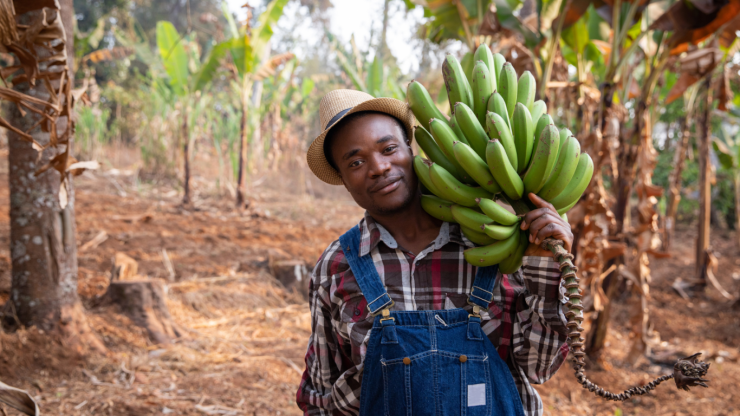






Other Episodes
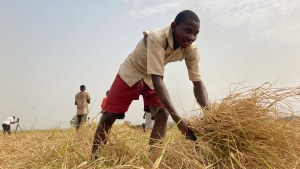 Food and Agriculture
Food and Agriculture
We need smart and efficient food systems to preserve the Earth—are young people the silver bullet?
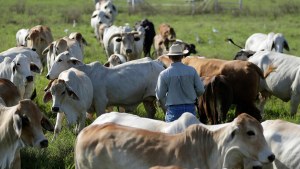 Food and Agriculture
Food and Agriculture
How can advancements in technology and nutrition revolutionize the global food system?
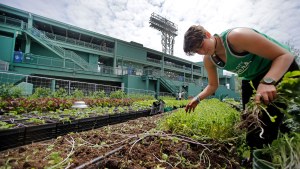 Food and Agriculture
Food and Agriculture
The Youth in Agriculture podcast examines new innovations required to improve the food system.
